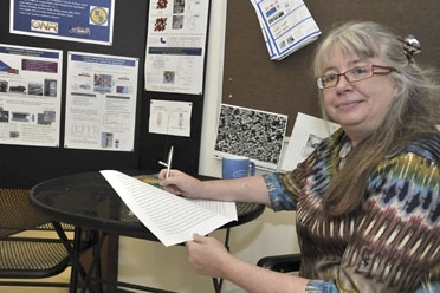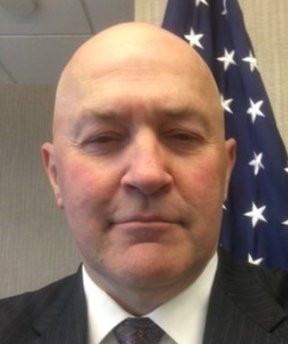Page 32 • (2,944 results in 0.011 seconds)
-

Researcher looks at how climate change leads to innovative science On Sept. 7, the PLU Chemistry department will host a seminar by Debra Rolison in Morken 103 from 12:30-1:35 pm. In her presentation, “How Subversion, Revolution, and Climate Change Lead to Innovative Science–Enhancing Electrochemical Energy…
September 5, 2012 Researcher looks at how climate change leads to innovative science On Sept. 7, the PLU Chemistry department will host a seminar by Debra Rolison in Morken 103 from 12:30-1:35 pm. In her presentation, “How Subversion, Revolution, and Climate Change Lead to Innovative Science–Enhancing Electrochemical Energy Storage on the Macroscale via Architectural Design on the Nanoscale,” Rolison will share her passion for empowering women and minorities in the sciences, and will give an
-
PLU graduate programs welcome Highline College Bachelor of Applied Science (BAS) degree graduates to move to the next level.
Ready to Scale Up?PLU graduate programs welcome Highline College Bachelor of Applied Science (BAS) degree graduates to move to the next level. Reach higher in your career with a graduate degree from the PLU School of Business. Earn your Master of Business Administration (MBA) in as little as one additional year of study. Eligible Highline BAS degrees include: Behavioral Science in Youth Development Global Trade and Logistics Respiratory Care Cyber Security and Forensics As an added benefit, if
-
The College of Natural Sciences houses the Biology, Chemistry, Computer Science, Environmental Studies, Geosciences, Mathematics, Physics, and Psychology programs.
PLU launches new data science major to meet growing demand in data-driven economy. Students learn essential analytical tools and techniques for extracting meaningful and precise insights from data. Lindsey Clark ’24 will return to PLU for her MA in Education and teaching credential. "The goal was to bring mathematics in new, fun, and interesting ways to students’ and their families’ lives,” Clark says. Physics major Julian Kop ’24 studied the universe and his family background at PLU. He
College of Natural SciencesMorken Center for Learning & Technology Floor 2 Tacoma WA 98447-0003 -
We are happy to announce that the polymer summer research experience (REU) program in the School of Polymer Science and Polymer Engineering at The University of Akron is open to apply. This competitive REU program is sponsored by the National Science Foundation and the University of Akron. Students will participate in…
2021 REU Internship at The University of Akron School of Polymer Science and Polymer Engineering Posted by: alemanem / February 3, 2021 February 3, 2021 We are happy to announce that the polymer summer research experience (REU) program in the School of Polymer Science and Polymer Engineering at The University of Akron is open to apply. This competitive REU program is sponsored by the National Science Foundation and the University of Akron. Students will participate in an 9-week internship to
-
PLU graduate programs welcome Grays Harbor College Bachelor of Applied Science (BAS) degree graduates to move to the next level.
Ready to Scale Up?PLU graduate programs welcome Grays Harbor College Bachelor of Applied Science (BAS) degree graduates to move to the next level. Reach higher in your career with a graduate degree from the PLU School of Business. Earn your Master of Business Administration (MBA) or Master of Science in Marketing Analytics (MSMA) in as little as one additional year of study.Eligible GHC BAS degrees include: Organizational Management Forest Resources Management Teacher Education As an added
-
PLU graduate programs welcome Renton Technical College Bachelor of Applied Science (BAS) degree graduates to move to the next level.
Ready to Scale Up?PLU graduate programs welcome Renton Technical College Bachelor of Applied Science (BAS) degree graduates to move to the next level. Reach higher in your career with a graduate degree from the PLU School of Business. Earn your Master of Business Administration (MBA) in as little as one additional year of study. Eligible RTC BAS degrees include: Application Development Computer Network Architecture As an added benefit, if you hold one of these degrees, we will waive your
-
PLU graduate programs welcome Tacoma Community College Bachelor of Applied Science (BAS) degree graduates to move to the next level.
Ready to Scale Up?PLU graduate programs welcome Tacoma Community College Bachelor of Applied Science (BAS) degree graduates to move to the next level. Reach higher in your career with a graduate degree from the PLU School of Business. Earn your Master of Business Administration (MBA) in as little as one additional year of study. Eligible TCC BAS degrees include: Community Health Health Information Management Applied Management IT Networking Information Systems & Technology As an added benefit
-
The word anthropology comes from the Greek words anthropos, meaning human, and logos, which refers to doctrine, theory or science.
Anthropology OverviewThe word anthropology comes from the Greek words anthropos, meaning “human”, and logos, which refers to doctrine, theory or science. Loosely defined, anthropology is the comprehensive study of humankind with an emphasis on culture. It is a holistic field which can touch on multiple specific disciplines, including humanistic approaches from history to literature the empirical or “natural” sciences from geology to physics, as well as behavioral studies such as sociology to
-

School of Business | passda@plu.edu | Following graduation from Washington State University with a BA in International Relations-Political Science, Mr.
Daniel Pass, MBA Email: passda@plu.edu Biography Biography Following graduation from Washington State University with a BA in International Relations-Political Science, Mr. Pass served for twenty years as an Army Intelligence Officer with multiple assignments in the United States plus tours overseas to Europe, Asia, South America and the Middle East. His has combat tours in Iraq for Desert Shield/Desert Storm in Southwest Asia, and in Somalia. Specific assignments included multiple Commands
Contact Information -
1.1 Describe key concepts, principles, and theories in psychological science 1.2 Develop a working knowledge of psychology's major subfields 1.
Learning Goals & OutcomesAPA Guidelines for the Undergraduate Psychology Major Version 3.0Revised 08/30/24GOAL 1: Content Knowledge & Applications1.1 Describe key concepts, principles, and theories in psychological science 1.2 Develop a working knowledge of psychology’s major subfields 1.3 Portray significant aspects of the history of psychological science 1.4 Apply psychological content to solve practical problems 1.5 Provide examples of psychology’s integrative themesGOAL 2: Scientific
Do you have any feedback for us? If so, feel free to use our Feedback Form.


